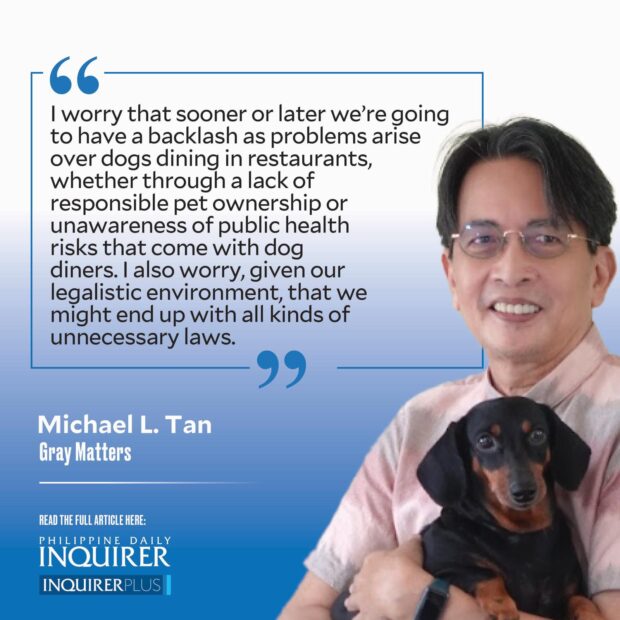Eating out with dogs
It was International Dog Day last Saturday, which got me thinking of today’s topic: the way people are taking their dogs to restaurants to eat out. For the Philippines, that’s such a change away from eating dogs.
My family already has a list of dog-friendly restaurants and malls, one which keeps getting longer. I’ll share that list in future columns, including updates, but for today I thought I should wear my hat as a veterinarian and a public health person to talk about some of the courtesies we need to institute given that there are no laws yet in the Philippines around canine restaurant diners. I worry that sooner or later we’re going to have a backlash as problems arise over dogs dining in restaurants, whether through a lack of responsible pet ownership or unawareness of public health risks that come with dog diners. I also worry, given our legalistic environment, that we might end up with all kinds of unnecessary laws.
In other countries, there is already a slew of laws that have been passed around dogs in restaurants. In the United States, 23 states now allow dogs in restaurants. The most updated list comes from Michigan State University’s Animal Legal and History Center (animallaw.info). Let me summarize the most common regulations.
Most states allow dogs to dine only outdoors or in a patio. The point is to have a separate area where dogs are allowed; some states even require separate entrances for customers with pets. All states prohibit employees from touching the dogs and if there is contact, they have to wash their hands immediately. Dogs are also not allowed to enter areas where food is prepared.
Dogs have to be kept on a leash at all times or “under reasonable control,” and Kentucky specifies “under control of an adult.” Dogs are not allowed on chairs, tables, and other furnishings. If I might give a local alternative: one of our family’s favorite restaurants, Señor de la O’, excellent Spanish food in an unlikely place, behind a Petron station and near the Cavite Institute in Silang. They provide a mat with a dish for food or water for dogs on the floor but, like most dog-friendly restaurants in the Philippines, do allow dogs on your lap or on a chair. I think we, dog owners, should meet restaurants halfway and bring our own dishes, and a piece of cloth to put over their chairs so it doesn’t get scratched or soiled.
The laws vary from state to state but generally require restaurants to provide dog eating and drinking utensils. A local model: JT (for Joel Torre) Manukan, provides plastic canisters for customers with dogs. Interesting, too, that JT Manukan is a kind of watering hole. Mabuhay to Joel Torre for helping change the stereotype of drinkers being dog-eaters. I’d love to see more macho guys drinking with their dog chums.
Back to the US. Some have provisions to clean up and sanitize areas immediately after an “accident” (pee or poo), the restaurants require to have the equipment (e.g., scoopers) to clean up, a responsibility of the dog owners. (I can imagine Filipino upper-class dog owners refusing to do this.)
There are a few atypical laws specific to some states:
Rhode Island allows restaurants to regulate the size and type of dogs allowed. Virginia allows dogs into certain areas of breweries (take note, craft beer outlets) and wineries. Georgia does not allow employees AND consumers (other restaurant diners) to feed dogs (presumably other than their own).
The tide has turned with dogs dining out but there’s still room for improvement. Locally, I cannot think of any Chinese restaurant that is dog-friendly. (Do email me if you know of one.)
Some of you might be wondering about cats. It seems only five states allow cats in restaurants. This is because there are more people with allergies to cats, and it’s harder to control cat hair from floating around. Cats are also harder to control. Cats are privileged though in the states where they’re allowed; they are allowed to sit on their owners’ laps.





















